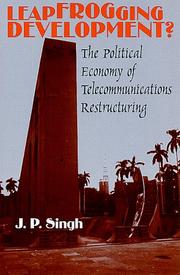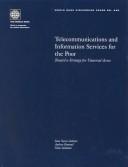| Listing 1 - 10 of 125 | << page >> |
Sort by
|
Book
ISBN: 905833242X Year: 2005 Volume: 102 Publisher: The Hague CPB Netherlands Bureau for Economic Policy Analysis
Abstract | Keywords | Export | Availability | Bookmark
 Loading...
Loading...Choose an application
- Reference Manager
- EndNote
- RefWorks (Direct export to RefWorks)
Computer architecture. Operating systems --- Netherlands --- Telecommunication policy --- -330.05 --- 384 --- Telecommunication --- Telecommunication and state --- Government policy
Book
ISBN: 1860671101 Year: 1996 Volume: *5 Publisher: London Cartermill Pub.
Abstract | Keywords | Export | Availability | Bookmark
 Loading...
Loading...Choose an application
- Reference Manager
- EndNote
- RefWorks (Direct export to RefWorks)

ISBN: 0791442942 0585282846 9780585282848 0791442934 1438420153 Year: 1999 Volume: *4 Publisher: Albany : State University of New York Press,
Abstract | Keywords | Export | Availability | Bookmark
 Loading...
Loading...Choose an application
- Reference Manager
- EndNote
- RefWorks (Direct export to RefWorks)
"Telecommunications restructurings are now seen as important barometers in the shift among developing countries toward market-based economies. They are often posited as helping developing countries "leapfrog," or accelerate their pace of development, and "connect" with the world economy. Leapfrogging Development? shows that most states in developing countries are unable to resolve the myriad pressures they face in restructuring important sectors like telecommunications to effect accelerated or "leapfrogging" development."--Jacket. "After examining seven cases (Singapore, South Korea, Mexico, Malaysia, China, Brazil, Myanmar), the book examines India as in in-depth "crucial case." Leapfrogging Development? proposes a unique framework that shows how groups and coalitions articulate development preferences and how, in response, different types of states respond to or shape these preferences."--Jacket.
Telecommunication policy --- Telecommunication --- Telecommunication and state --- Government policy --- Case studies --- E-books
Book
ISBN: 9264166793 9264166785 Year: 2012 Publisher: [Place of publication not identified] : OCDE,
Abstract | Keywords | Export | Availability | Bookmark
 Loading...
Loading...Choose an application
- Reference Manager
- EndNote
- RefWorks (Direct export to RefWorks)
El presente estudio ha sido realizado por la Dirección de Ciencia, Tecnología e Industria de la ocde (dsti) bajo los auspicios del Comité de Políticas de la Información, Informática y Comunicación (Comité iccp) en respuesta a una solicitud del gobierno de México, a instancias de la Comisión Federal de Telecomunicaciones (Cofetel), y a través de la Secretaría de Comunicaciones y Transportes (sct), por ser ambas instituciones las encargadas de representar a México en el Comité iccp. La revisión de la ocde de la política y la regulación de las telecomunicaciones tomó como base las respuestas de las autoridades mexicanas a un cuestionario, así como los resultados de una extensa serie de entrevistas realizadas a los principales actores del sector de las telecomunicaciones durante una misión de investigación efectuada en México. El informe fue objeto de una revisión de pares en el Comité iccp el 27 de octubre de 2011, siendo la revisión encabezada por la doctora Mónica Ariño (Ofcom, Reino Unido) y el señor François Lions (arcep, Francia). Se terminó a principios de noviembre de 2011 y refleja los avances hasta ese momento.
Science and Technology --- Governance --- Mexico --- Telecommunication policy --- Telecommunication --- Telecommunication and state --- Government policy
Book
ISBN: 9780511813092 9780521884310 9780521711227 9780511651922 0511651929 0511813090 0521884314 0521711223 0511699425 1107200326 0511604610 0511603835 0511603053 Year: 2009 Publisher: New York Cambridge University Press
Abstract | Keywords | Export | Availability | Bookmark
 Loading...
Loading...Choose an application
- Reference Manager
- EndNote
- RefWorks (Direct export to RefWorks)
This book studies policymaking in the Latin American electricity and telecommunication sectors. Murillo's analysis of the Latin American electricity and telecommunications sectors shows that different degrees of electoral competition and the partisan composition of the government were crucial in resolving policymakers' tension between the interests of voters and the economic incentives generated by international financial markets and private corporations in the context of capital scarcity. Electoral competition by credible challengers dissuaded politicians from adopting policies deemed necessary to attract capital inflows. When electoral competition was low, financial pressures prevailed, but the partisan orientation of reformers shaped the regulatory design of market-friendly reforms. In the post-reform period, moreover, electoral competition and policymakers' partisanship shaped regulatory redistribution between residential consumers, large users, and privatized providers.
Energy policy --- Telecommunication policy --- Telecommunication --- Telecommunication and state --- Government policy --- Social Sciences --- Political Science
Book
ISBN: 9812303812 9812305661 9812303820 Year: 2007 Publisher: Singapore : Institute of Southeast Asian Studies,
Abstract | Keywords | Export | Availability | Bookmark
 Loading...
Loading...Choose an application
- Reference Manager
- EndNote
- RefWorks (Direct export to RefWorks)
"Ninety-nine percent of Filipinos are waiting for a telephone and the other one percent for a dial tone..." - Lee Kuan Yew, November 1992. A decade after the above quote, far reaching reforms in the telecommunications sector has dramatically changed the situation in both the Philippines and Malaysia. By looking at the institutions and actors that drove these changes, this book examines state capacity, market reform, and rent-seeking in the two countries. In doing so, the study challenges conventional depictions of the Malaysian and Philippine states. It contends that despite the weakness of the Philippine state, reform occurred through a coalition that out-manoeuvred vested interests. In Malaysia, although considered a strong state, patronage and rent-seeking played key roles in policy adoption and implementation. The study also demonstrates how the nature of groups supporting reform shapes policy implementation and its outcomes. Finally, while liberalisation removes monopoly rent, this book shows that it can also create other types of rents.
Privatization --- Telecommunication policy --- Telecommunication --- Telecommunication and state --- Denationalization --- Privatisation --- Contracting out --- Corporatization --- Government ownership --- Government policy

ISBN: 1280356510 9786610356515 9264009515 9264009507 Year: 2005 Publisher: Paris, France : OECD,
Abstract | Keywords | Export | Availability | Bookmark
 Loading...
Loading...Choose an application
- Reference Manager
- EndNote
- RefWorks (Direct export to RefWorks)
The OECD Communications Outlook 2005 presents the most recent comparable data on the performance of the communication sector and policy frameworks in OECD countries. The data provided in this report map the six years of competition for many OECD countries that fully opened their market to competition in 1998. The 2005 edition also analyses the communications sector over the years following the ""dotcom bubble"" crisis and explores future developments. The OECD Communications Outlook provides an extensive range of indicators for the development of different communications networks and compares
Telecommunication --- Telecommunication policy --- Telecommunication and state --- Electric communication --- Mass communication --- Telecom --- Telecommunication industry --- Telecommunications --- Government policy --- Communication --- Information theory --- Telecommuting
Book
ISBN: 9264224289 9789264224285 Year: 1983 Publisher: Paris: OECD,
Abstract | Keywords | Export | Availability | Bookmark
 Loading...
Loading...Choose an application
- Reference Manager
- EndNote
- RefWorks (Direct export to RefWorks)

ISBN: 1280087935 9786610087938 0585450803 0821351214 Year: 2002 Publisher: Washington, D.C. : World Bank,
Abstract | Keywords | Export | Availability | Bookmark
 Loading...
Loading...Choose an application
- Reference Manager
- EndNote
- RefWorks (Direct export to RefWorks)
Telecommunication policy. --- Telecommunication --- Information technology --- Digital divide. --- Divide, Digital --- GDD (Global digital divide) --- Global digital divide --- Information society --- Society and telecommunication --- Telecommunication and state --- Social aspects. --- Government policy
Book
ISBN: 9264129405 Year: 1987 Publisher: Paris
Abstract | Keywords | Export | Availability | Bookmark
 Loading...
Loading...Choose an application
- Reference Manager
- EndNote
- RefWorks (Direct export to RefWorks)
| Listing 1 - 10 of 125 | << page >> |
Sort by
|

 Search
Search Feedback
Feedback About UniCat
About UniCat  Help
Help News
News